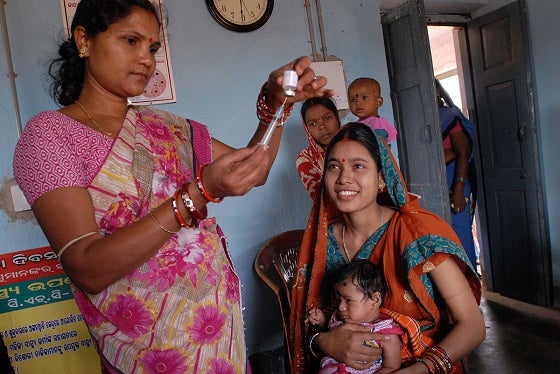Summary
At the United Nations General Assembly from 17-24 September 2019, a key issue on the agenda was health. Several UN member states, including India, participated at the UN high-level meeting on universal health coverage (UHC) to raise awareness for investing in accessible and affordable health systems. India’s leadership grew from the Modi government’s ambitious domestic health coverage program – Ayushman Bharat – that has just hit its one-year mark.
The high-level meeting on universal health coverage (UHC) at the United Nations General Assembly marks the first time a systemic, not incidental, health issue has been brought to the United Nations. The intention was to generate as much political support for the cause from various countries that would increase financial commitments for health care back home. UHC means that all people across the world have access to health services, when needed, without hardship.
Besides participating at UHC discussions, Indian Prime Minister Narendra Modi promised political and financial commitments to expand domestic health coverage that includes scaling up health service delivery, broadening financial protections for health and increasing access to essential medicines and vaccines. A political commitment towards UHC boosts India’s reputation as a global health contributor, staking its claim as a country that deems public health as a core priority and vehicle to prosperity, not necessarily a constraint or second-order responsibility. That said, Modi’s interest and leadership has to be placed in context – India’s pledged commitments toward UHC arise out of domestic health initiatives, notably the Ayushman Bharat initiative, the Modi government’s ambitious health policy launched in 2018.
India’s UHC participation and broader commitment to health systems comes out of circumstance and a sober realization that societal and individual ill-health harms economic development. Historically, India’s importance to global health campaigns like HIV, malaria and tuberculosis (TB) has been as a recipient of global efforts to arrest those conditions. Necessity drove such external interventions; India lacked the financing and knowhow to mount targeted campaigns giving space for international organizations and foundations to act. The onset and spread of infectious diseases over the decades rendered such interventions necessary. Gradually, the ground has been shifting with India’s importance to global health rising due to its sheer size. Liberalization has also altered the nature of India’s disease burden with noncommunicable diseases (NCDs) like heart disease, diabetes and cancer now the leading source of death and debility. Indian citizens also, arguably, have a genetic predisposition to such conditions but equally important, now, are unhealthy diets and sedentary lifestyles. In fact, one in four Indians die from these three conditions before turning 70.
To make a dent on chronic conditions, a focus on health systems is critical and that is why India’s endorsement of the UHC becomes vital. Ayushman Bharat includes a national health No. 707 – 7 October 2019 2 protection scheme that hopes to cover 100 million Indian citizens particularly vulnerable to health risks. The scheme currently supports 5 million citizens, covering their secondary and tertiary care hospitalization. Though Ayushman Bharat is a centrally mandated policy, implementation occurs at the state-level giving states room to align the scheme with their health goals. In terms of global health, Ayushman Bharat nets two benefits. First, the initiative gives India credibility when supporting multilateral issues like UHC, not just demonstrating India’s importance to discussions but also how UHC gets implemented. Other developing countries could gain from India’s experience. And second, international campaigns like UHC are one lever to drive domestic support for health policies, like Ayushman Bharat, previously deemed expensive, infeasible or unpalatable. When the time comes to retool Ayushman Bharat or generate additional funds for specific parts of the policy, UHC could be leveraged given India’s ringing endorsement.
Recent evidence on Ayushman Bharat’s effectiveness indicates that health funding needs to be increased for India’s most vulnerable citizens who still find themselves out of the mainstream health apparatus. Public spending on healthcare now is 1.2 per cent of GDP with most of it allocated for curative services once an illness occurs, not preventive. Both primary and preventive care needs greater attention. In addition, Indian health officials have to fix a litany of institutional quandaries pertaining to fraud, specifically the quality of hospitals, how medical procedures are assigned and how to include states like Odisha, West Bengal, Telengana and Delhi who have chosen not to join the initiative. UHC’s comprehensiveness could compel Indian health officials to address these problems.
India has generally been regarded as a global health laggard – keen to leverage international health campaigns to target and quell infectious diseases like malaria and TB while not contributing with its ideas and policies. That trend is changing. Ayushman Bharat gives Indian health officials an opportunity to fix issues that have long plagued India’s health system – paucity and maldistribution of health professionals, inaccessible healthcare centres, exorbitant health costs that spike out of pocket payments, unaffordable medicines and low access to digital health technologies – and demonstrate to the global health community how these problems can be addressed. India’s pledge to the UHC represents not an aberration but, perhaps, a harbinger in terms of what we can expect going ahead from New Delhi on global
health.
….
Dr Karthik Nachiappan is Research Fellow at the Institute of South Asian Studies (ISAS), an autonomous research institute at the National University of Singapore. He can be contacted at isaskn@nus.edu.sg. The author bears full responsibility for the facts cited and opinions expressed in this paper.
-
 More From :
More From :
-
 Tags :
Tags :
-
 Download PDF
Download PDF



